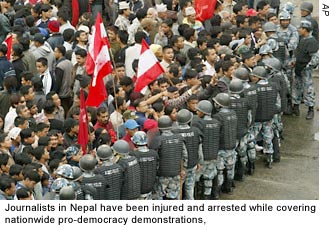New York, April 18, 2006—More than 200 Nepalese journalists have been detained since April 4 while participating in pro-democracy protests to demand press freedom or while covering the nationwide demonstrations, according to information compiled by the Federation of Nepalese Journalists (FNJ). The Committee to Protect Journalists calls for the immediate release of the 31 journalists who remain in custody.
“Nepal’s journalists have fought admirably for the restoration of press freedom since King Gyanendra seized power and curbed their rights in February 2005,” said CPJ Executive Director Ann Cooper. “The continued detention of more than 30 of our colleagues is a harsh reminder that the present regime regards a free press as a threat to its legitimacy. We call for their immediate release.”
Those still jailed include 20 journalists who were given a 90-day detention order by district administrators in Kathmandu on Sunday, according to FNJ reports. The journalists, members of Kathmandu-based press organization Press Chautari Nepal, had protested recent arrests and physical assaults targeting journalists. They are being held at Dashrath Stadium in Kathmandu. Also in custody is Kanak Mani Dixit, a veteran journalist who was detained while participating in a protest on April 8.
Three journalists and a driver employed by the Kantipur media group were detained today while covering a protest staged by civil servants at the government complex Singha Durbar. Twenty-seven government employees were also arrested, the online version of Kantipur reported.
Home Ministry officials said they would release the staff members if Kantipur did not report the arrests, according to sources at the organization. The news outlet refused to bow to government pressure and went ahead with the reports. The four men were released this evening and were welcomed back to work by cheering colleagues.
As demonstrations continue throughout the country, the United Nations and allies of Nepal have called on the government to use restraint when confronting pro-democracy protesters. At least five protesters have been shot to death by security forces. Several journalists have been injured as security forces used rubber bullets, tear gas, and batons to disperse the crowds.
Also today, press freedom advocates Rabi Raj Bhandari and Khar Singh Khadka filed a petition with the Supreme Court today, challenging a repressive new media law promulgated early this month and announced on Sunday. The law stiffens the penalty for defamation, institutes specific bans on reporting on the government’s conflict with Maoist rebels, and orders private FM radio stations to stop broadcasting news. Since the new law was announced, several radio stations have received verbal orders from local administrators to silence their news broadcasts, according to local news reports. Journalists and lawyers in Nepal have argued that the law violates constitutional safeguards on free expression.
“This media law is unconstitutional and presents a real threat to the ability of Nepal’s press to function at all,” CPJ Executive Director Ann Cooper said. “It should be scrapped.”
